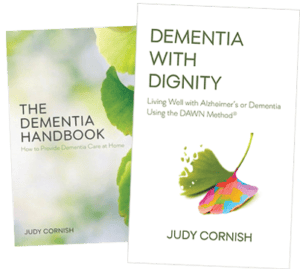How we feel dictates how we behave
It sounds obvious, but it’s easy to forget when providing dementia care: Behaviors come from emotions. And how people feel becomes critically important when they are losing rational thought, because it’s rational thought that helps us control our behavior. In order to experience dementia and wellbeing at the same time, we need the help of our caregivers.
I believe that meeting emotional needs is the essence of being a dementia caregiver.”
Judy Cornish
I believe that meeting emotional needs is the essence of being a dementia caregiver. Most books and training programs offer caregivers ideas on how to manage their charges in specific situations, such as when eating, bathing, dressing, or going to appointments. However, any situational behavior could be caused by a variety of emotional needs. Making environmental changes may help, but unless the emotional need driving the behavior is met, problems will continue.
Lack of security causes fear-driven behaviors
Experiencing progressive cognitive impairment is terrifying. To wake up from a nap and not be able to make sense of your surroundings, to find yourself unable to figure out what month it is let alone day of the week, or to be greeted by a family member you cannot identify, is deeply unsettling. Having dementia means realizing that although you are failing in a few ways today, soon you will be completely unable to care for yourself.
Helping someone find wellbeing in dementia
We, as caregivers, need to keep our loved ones’ insecurity in the forefront of our minds. We can help them feel more secure by repeating the facts they cannot recall whenever needed. We can chatter about what’s just happened, where we are now, and why, and what will happen next. We can happily join in completing tasks, rather than correcting or directing, and avoid expressing concern or irritation over lapses of memory and newly lost skills. If we show our loved ones that we are glad to share our own rational thinking with them, and work with them to enjoy the day together, they will begin to feel more secure.

Lack of wellbeing causes refusals and obstinacy
Experiencing progressive cognitive impairment is also very frustrating. We spend our childhoods building skills and learning new things, and our adult years enjoying competency in countless ways. When elderhood arrives, it’s time to relax and share our wisdom and success.
But, when dementia comes into the picture, the opposite happens. We find ourselves becoming unable to follow a train of thought, complete a simple task, recall our nearest and dearest, or recognize even the most familiar things. We are constantly being corrected by people younger than us, we seem to require everyone’s care and attention, and we are no longer taken seriously. Even in the simplest conversation we fail. Add to that no hope of improvement or recovery—and who wouldn’t be frustrated and obstinate.
People with dementia need the opportunity to succeed in conversation and exercise choice in order to experience wellbeing
We, as caregivers, need to remember that having nothing to offer in relationships is so debilitating that even just getting through a conversation without embarrassment can be uplifting. We need to ensure that our loved ones are given all possible opportunities to exercise choice and make decisions, and help them find the beautiful things in life that don’t require rational thought to enjoy. In these ways we can cultivate a sense of wellbeing in dementia.
When we, as caregivers, think first about our loved ones’ emotional state, and the emotion driving the behavior, we can resolve behavioral problems before they become ingrained and put safety at risk.
§
Sign up for our newsletter and free video series
Sign up for our monthly newsletter and get more advice on how to help someone experiencing dementia. As a bonus, you’ll get our free video series, “Preparing for Dementia.”




